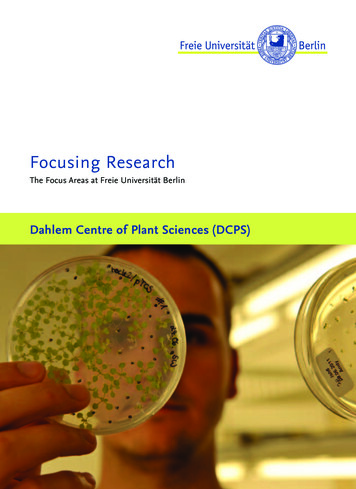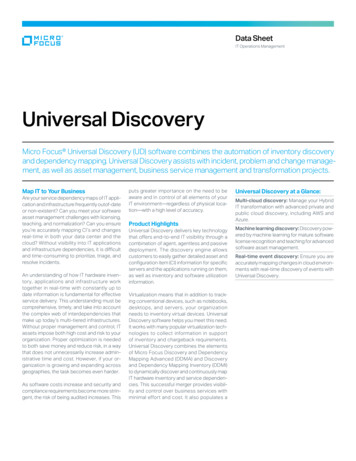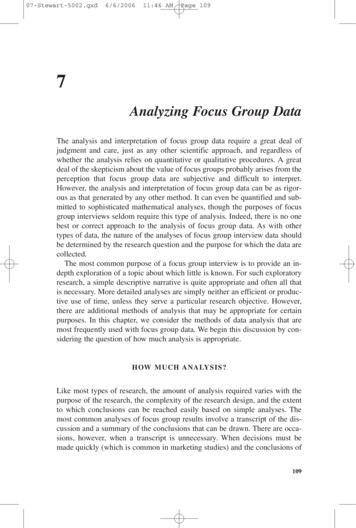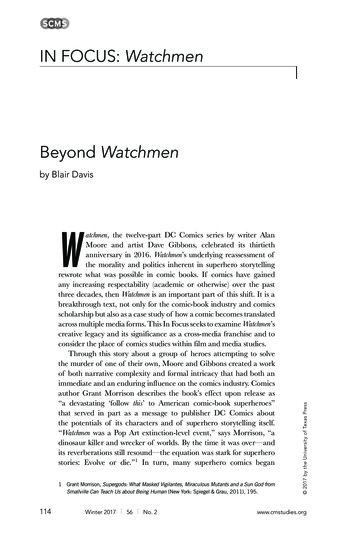
Transcription
Focusing ResearchThe Focus Areas at Freie Universität BerlinDahlem Centre of Plant Sciences (DCPS)
Focus AreaDahlem Centre of Plant Sciences (DCPS) Focus Areas of Freie Universität Berlin . . . . . . . . . . Page 6The Dahlem Centre of Plant Sciences: an Overview . . . . Page 8 Current Fields of Research A Look at the Centre’s Research Activities . . . . . . . . . Page 18 Regional, National, and Global Networks . . . . . . . . . Page 20 International Projects. . . . . . . . . . . . . . . . . . . . Page 24 Support for Students and Junior Researchers . . . . . . . Page 26. . . . . . . . . . . . . . . . Page 14DAHLEM CENTRE OF PLANT SCIENCES (DCPS) 3
Focusing ResearchPublisherExecutive Board of Freie Universität BerlinCenter for Cluster Development (CCD)Kaiserswerther Straße 16 – 1814195 Berlin, GermanyBerlin, December 2011Editors CoordinationNicole Körkel, Caroline Rued-Engel, Guido von ThaddenTranslationKERN AG – Global Language ServicesLayoutUNICOM Werbeagentur GmbHPrintingDruckerei Heenemann GmbH & Co. KG4 Freie Universität Berlin
Focusing Research Focus Areasof Freie Universität BerlinOne special feature of the excellent, broad-based research performedat Freie Universität Berlin is the university’s targeted formation of research alliances called Focus Areas.The Dahlem Centre of Plant Sciences (DCPS) has been one of the FocusAreas of Freie Universität Berlin since2009. Photo: B. WannenmacherWithin the Focus Areas, scholars and scientists from different subjects,disciplines, and institutions at Freie Universität work together over alonger period on complex research topics related to subjects of greatimportance to society.The Focus Areas help to strengthen the areas of emphasis within theuniversity’s research activities and further develop these areas in cooperation with social, political, and economic players.The Focus Areas can be arranged differently, depending on the specificdisciplines, the issues currently being studied, and the individuals involved. The options range from platforms fostering the discussion ofideas, with multifaceted courses and events – such as the TransregionalStudies Salon series within the Center for Area Studies (CAS), one of theFocus Areas – to compact alliances dedicated to studying one key areaof focus in current research activities, such as nanotechnology in the NanoScale Focus Area.Focus AreasStructure and Organization of the Focus AreasThe Focus Areas are platforms for the development of research ideasgrowing out of interdisciplinary and interdepartmental initiatives. Theyrepresent the very highest level of quality in research activities – guaranteed through ongoing evaluations. Each Focus Area has a spokes person,who represents that Focus Area within the university and beyond.The three strategic centers of Freie Universität provide crucial supportto the Focus Areas:The Center for Cluster Development (CCD) – which will continue asthe Center for Research Strategy (CRS) within the scope of the university’s new institutional strategy – supports and monitors the initial development, management, and evolution of the Focus Areas. The Center for International Cooperation (CIC) supports the FocusAreas with regard to worldwide cooperative arrangements and international visibility. Dahlem Research School (DRS) offers advice and assistance for theFocus Areas with regard to measures in support of junior researchers. Growing and thriving: DCPS is to become a multidisciplinary center of research at Freie Universität with a highinternational profile. Photo: M. RilligThe Henry Ford Building at Freie Universität, lecture hall building and conference center. Photo: B. WannenmacherGoals of the Focus AreasTaking up research trends and exploring them in interdisciplinaryalliances Pooling skills and expertise to answer current research questions Initiation of new projects and solicitation of funding The Concept of the Focus Areas is Based on Three Key PrinciplesExcellence in research across disciplines – for society, the politicalsphere, and the economy Networking and cooperative arrangements – regional, national,and worldwide Support for junior scholars and scientists – well structured, thorough, and comprehensive 6 Freie Universität BerlinDahlem Centre of Plant Sciences (DCPS) 7
FOCUSING RESEARCHDCPS: AN OvERvIEWThe Dahlem Centre of Plant Sciences:an OverviewThe existence of animals and human beings on Earth depends onplant life. Species and climate protection, food security and renewable energies are important concerns for the entire planet, and thuscentral areas of research for plant scientists.“We are bringing the many differentbranches in plant science together,thereby opening up new fields of research. It’s thrilling to work in thiskind of cooperative environment andfind solutions that would have beenout of reach with just your own specific discipline as background.”Professor Thomas Schmülling,Director of the Focus AreaPhoto: D. AusserhoferResearch at DCPS covers a broadspectrum in terms of content and methodology: Experts from the molecular, ecological, and phylogenetic plantsciences work together here.Photo: B. WannenmacherIn light of current global changes, such as climate change, soil salinization, species extinction, and shrinking agricultural land, plant scienceswill continue to grow in importance into the future. Covering a broadspectrum of plant research in terms of both methods and focus, DCPS ishelping to find solutions to these issues. Research topics at DCPS rangefrom the functions of genes to the evolutionary connections in the origins of biodiversity and beyond, to the interaction between plants andtheir biotic or abiotic environments.Research at DCPSResearchers in the molecular, ecological, and phylogenetic plant sciences work together at DCPS on two major topics: “Diversity and Function”and “Plant and Environment.”DCPS intends to use the results of the research performed in both areasof focus, as a foundation for work on unresolved research issues in theapplied plant sciences.Organizational Chart of DCPSFreie Universität BerlinFocus Area: Dahlem Centre of Plant Sciences (DCPS)Goals of DCPS DCPS aims to achieve a detailed, broad-based understanding ofplant life and plant diversity. DCPS also plans to use current research findings as the basis fordeveloping new methods and tools to enable effective protectionand sustainable use of plant diversity.EcologicalPlant SciencesMolecularPlant SciencesDiversity and FunctionPhylogeneticPlant SciencesPlant and EnvironmentDCPS Research Unit:DFG Research Centre:DCPS Research Unit:SFB Initiative:Changes in OrganismalComplexity across KeySteps in Plant EvolutionCenter for BiodiversityAnalysis and Synthesis –CEBAS (Proposal)The Invisible Half:Relevance of Root Intrinsicand Extrinsic Factors forAbove-Ground ParametersPriming and Memory ofOrganismic Responses toStress (Proposal)Applied Plant SciencesConservation of Diversity and Sustainability8 FREIE UNIvERSITäT BERLINDAHLEM CENTRE OF PLANT SCIENCES (DCPS) 9
FOCUSING RESEARCHDCPS: AN OvERvIEWDCPS: Facts and FiguresDisciplines Represented at DCPSResearchers also study the relationships among different plant taxa allover the world. Shown here, Cynoglossum columnae. Photo: H. HilgerPlant life is affected by a large number of different factors. To be ableto look at all of these many aspects within its research activities, DCPScovers a broad range of plant sciences, from applied plant genetics topharmaceutical biology. More than 160 scientists, about 300 staff members in all, cooperate in the DCPS’s currently 20 research groups.Term of fundingNumber of research groups involved20When implementing research projects on environmental themes, it isalso essential to include geoscientists, legal specialists, and political scientists. Computer scientists and mathematicians make vast amounts ofdata available and provide support in processing and interpreting thedata. Complex issues and facts regarding DCPS that are to be disseminated to the public are prepared together with specialists in educationand teaching methodology.Scientists involvedabout 165of which, doctoral candidatesabout 70Freie Universität departments involvedBiology, Chemistry, PharmacyRegional cooperation partners18International cooperation partnersabout 20October 1, 2009 –December 31, 2014Funding volume 1,800,000within institutional strategyDCPS scientists work together with experts all over the world. The centre maintains cooperative relationships with more than 20 institutions in Europe, Asia, Africa, and Latin America.Photo: B. WannenmacherBotanic Garden and Botanical MuseumApplied Genetics Evolution and Biodiversity of PlantsTaxonomy and FloristicsBiodiversity InformaticsHistory of Plant SciencesApplied Zoologe Animal Ecology Molecular EcologyMolecular Developmental Biology of PlantsMolecular Plant GeneticsPlant Molecular and Cell BiologyMolecular Biology of OrganellesSignal Transduction of PlantsPlant Biochemistry and Physiology Plant BiochemistryPlant PhysiologyPlant EcophysiologyPlant Nitrogen MetabolismPlant Ecology and SystematicsPharmacy Pharmaceutical BiologySystematic Botany and Plant GeographyMorphology and SystematicsBiodiversity - Ecological ModellingFunctional BiodiversityMultitrophic BiodiversityPlant Ecology10 FREIE UNIvERSITäT BERLINDAHLEM CENTRE OF PLANT SCIENCES (DCPS) 11
Career-PathPostdoc in Plant PhysiologyDr. Martin Frenkel“DCPS is still very young, and it always takes time for a large number of researchers spread across multiple institutions to grow together. I’m makingefforts in that direction because I think DCPS has a huge amount of potential. Our fundamental research is helping us unlock a detailed understanding of plants, and the many cooperative arrangements at DCPS put us on abroad basis, supplementing our own expertise and saving resources as wellas opening up new ideas and allowing us to study larger contexts. And – andthis is important in itself – we can also publish more this way.”Martin Frenkel studied biology at Johannes Gutenberg University Mainz.During an ERASMUS exchange, he attended Umeå Plant Science Centre(UPSC) in Sweden. He earned his doctorate in the Department of Ecology and Environmental Science at Umeå University, in close cooperationwith UPSC, and then moved to the Institute of Botany at Heinrich HeineUniversity Düsseldorf. Since 2010, he has been a research associate atthe Institute of Biology at Freie Universität.Within the institute, Martin Frenkel is part of the Plant Physiology researchunit, investigating the stress physiology of plants. He studies how stresscaused by light affects the interactions between animals and plants – anaspect that has barely been studied thus far anywhere in the world.Dr. Martin Frenkelleft: For his research, Dr. Martin Frenkel uses fast protein liquid chromatography (FPLC), a method of separating and purifying proteins.His goals: successful collaborative research and a professorship.A pulse-amplitude modulation (PAM)fluorometer is used to study the effi ciency of photosynthesis. Photos: B. Wannenmacher Dahlem Centre of Plant Sciences (DCPS) 13
Focusing Research Current Fields of Research at DCPSThe research performed at DCPS focuses on two main key themes“Diversity and Function” and “Plant and Environment.”Current Fields of Researchof biological diversity. During their research into genome sequence andstructure, researchers at DCPS work closely with the newly establishedBerlin Center for Genomics in Biodiversity Research.Plant and EnvironmentDiversity and FunctionIn their research on diversity and function, the scientists at DCPS aim toproduce new insights into the evolution of the morphological and functional diversity of plants.Detail of the epidermis of an Arabidopsis leaf. The activity of gene expression becomes visible through theuse of GFP (green fluorescent protein).The red fluorescence is due to chlorophyll activation. Photo: M. BaierResearchers hope findings from current research at DCPS will enablesustainable use of plant diversity. Photo: M. Riefler14 Freie Universität BerlinUnlike people and animals, plants are bound to a single location. Owingto the way they live, and in the context of constantly changing environmental conditions, plants have developed a wide range of functions andadaptive reactions. Research into these complex connections is the second major topic of study at DCPS.The topics addressed include the evolution and function of signal transfer processes in plant cells, the roles of the numerous secondary metabolic products of plants, such as plant-based antibiotics or insecticides,the uptake and utilization of nutrients, and the development of morphological features.The research concentrates on plant reactions to such abiotic stress factors as light intensity, extremes of temperature, lack of water and nutrients, and biotic interactions between plants and other organisms, suchas insects or fungi.The work performed in this research area is based on the rapidly growing information available from genome sequencing. By now, this information goes far beyond the model plant Arabidopsis, previously thefocus of much research, and opens up numerous approaches that contribute to a better understanding of gene functions and the evolutionThe DCPS research groups are working on such diverse themes as, forinstance, the responses of plants to pests, plants’ cellular memory ofenvironmental stress, the role of root architecture in fungi colonizationand its significance for crop yield, and the mechanisms by which neighboring plants communicate with each other.Growing tobacco plants on artificialgrowth media in plant chambers. Photo: M. RieflerOne topic of research at DCPS is howplants react to pests. Shown here isa beet armyworm (Spodoptera exigua)caterpillar, a member of the Noctuidae, or owlet moth, family, a frequentpest on crops. Photo: A. SteppuhnDahlem Centre of Plant Sciences (DCPS) 15
Career-PathJunior Professor at the Institute of BiologyDr. Susanne Wurst, Junior Professor“DCPS connects individual research groups with each other, giving rise tomore cooperative initiatives within the university. All benefit from the expertise of colleagues from other disciplines and from shared equipment. Research topics are discussed from different viewpoints; this leads to synergiesand, together with start-up funding for innovative projects, to progress inresearch.”Susanne Wurst studied biology at the University of Göttingen andholds a Ph.D. from the Technical University of Darmstadt. Afterwards,she worked for three years at the Netherlands Institute of Ecology, inHeteren, in the EU-funded Marie Curie research and training network BIORHIZ. She moved to Freie Universität in 2008 and was appointed ajunior professor at the Institute of Biology in March 2009.Within DCPS, Susanne Wurst is the head of the Functional Biodiversityresearch group. With her team, she studies how organisms in the soilaffect individual plants and plant communities. From the perspective ofglobal change, the team is exploring the impact of intensified agricultural systems and exotic species invasions on the diversity and functionof ecosystems.Her goals: to continue to combine ecological research and teachingactivities and be appointed to a permanent professorship.Junior Professor Susanne Wurst Photo: D. Ausserhoferleft: A look into the main tropical greenhouse at the Botanic Garden in Berlin’s Dahlem district. Withabout 22,000 species, it is one of theworld’s three most prominent botanical gardens and is considered a majorsite of biodiversity research. The garden draws more than 300,000 visitorseach year, including researchers fromall over the world. Photo: BGBMExperiments in the greenhouse: Plantcommunities – affected by herbivoresand arbuscular mycorrhizal fungi. Photo: M. RilligDahlem Centre of Plant Sciences (DCPS) 17
Focusing Research A Look at the Centre’s Research ActivitiesThe many research projects pursued at the DCPS Focus Area are allmarked by interdisciplinary cooperation among scientists. For a closer look at one example of this approach in action and the opportunities arising from collaborative research, we turn to one project of themany under way within the Focus Area.Multitasking in PlantsProfessor Tina Romeis studies signaltransmission processes in plants under stress. Photo: D. AusserhoferTobacco hornworm larvae feeding, asthe name suggests, on tobacco. Photo: A. Steppuhn18 Freie Universität BerlinWhen people and animals experience stress, their bodies produceadrenaline, which enables them to flee or attack. Plants also experiencestress, due to abiotic factors, such as too much or too little water, heat,or cold, or due to biotic factors, such as caterpillars, bacteria, and fungi. Unlike animals and people, though, plants cannot move from wherethey are. They have developed other mechanisms of surviving outsideattacks, whether above or below the ground.What specific defense mechanisms are involved, and how plants determine how to defend themselves successfully, are the questions three researchers at DCPS are studying in their interdisciplinary project, “Multitasking Plants.” All of them are working on the same plant species, butfrom different perspectives: Working with a model comprising a tobaccoplant, the tobacco hornworm, and a specific root fungus, they study howplants deal with multiple factors and problems at once.A look at the Centre’s Research ActivitiesProfessor Tina Romeis, studies the connections from a biochemical perspective, examining the early signal transfer processes. “Plant b ehaviorunder stress is multifaceted,” she says. “A plant responds to a fungal infection or to being eaten by caterpillars differently from how it does todrought or heat.”Professor Anke Steppuhn, in turn, studies whether these reactions canaffect the way the plant interacts with other organisms. Steppuhn, a ju nior professor of molecular ecology, studies how tobacco plants defendthemselves from herbivores.As for how biotic interactions taking place below the ground affect theplant, that is what Professor Susanne Wurst, is studying. Wurst, a ju nior professor of functional biodiversity, and her research group studywhether the presence of a fungus in the plant’s roots, for instance, alsoaffects how the leaves defend against consumption by herbivores.Professor Anke Steppuhn studies howplants interact with other life forms. Photo: D. AusserhoferResults and OutlookThe results indicate that previous biotic stress, such as bacterial infections in the leaves or inoculation of the roots with a fungus, changes theplant’s defensive reactions to herbivores.The results of this research are particularly interesting for the field ofagriculture, where there is an urgent need to identify crops that are ableto cope well with stress – and, ideally, are able to multitask as well.Abiotic and biotic factors alike cancause stress in plants. Researchersstudy how different plants respond todifferent stresses. Figure: A. Steppuhn 19
FOCUSING RESEARCHNETWORKSRegional, National, and Global NetworksRegional Cooperation PartnersBerlin’s Dahlem research campus and the fertile academic and scientificenvironment in the wider Berlin-Brandenburg region, which is home toa large number of research institutions, offer ideal conditions for cooperative projects. The scientists at DCPS work with 18 partner institutionsin the region, both within the higher education sector and outside it,pursuing groundbreaking research issues.The Focus Area supports interdisciplinary research projects, making itan important starting point for soliciting funding.The Focus Area is a platform for regional and international interdisciplinary collaborative research projects. DCPS promotes cooperationamong those working in the plant sciences throughout Berlin andBrandenburg and highlights their activities internationally.Plant sci
Organizational Chart of DCPS The Dahlem Centre of Plant Sciences: an Overview The existence of animals and human beings on Earth depends on plant life. Species and climate protection, food security and renew-able energi











